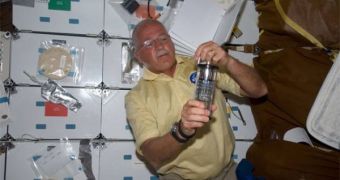The US Centers for Disease Control and Prevention (CDC) estimate that approximately 40,000 US citizens contract salmonella every year, primarily from unwashed food. The bacterium can do some serious damage inside the body, and outbreaks are not at all uncommon. Against it, many pharmaceutical companies have attempted to develop vaccines or other forms of treatment, to various degrees of success. Now, Austin, Texas-based Astrogenetix is applying for approval from the CDC for starting human trials with its new salmonella vaccine, obtained from research done in orbit.
The International Space Station (ISS) has been touted as the most important research facility in the world today, mostly because it took more than $100 billion, and about 11 years, to build. Rather than housing weapon research, as one could expect from an orbit-based research facility, the station is home to a very large number of scientific experiments, which are all designed to further knowledge in specific fields of research back on Earth. From physics and chemistry to medicine and technology, nearly every line of study is represented by a project or an ongoing investigation on the lab.
However, because of technology restraints, not every experiment that deserves to be in orbit reaches the orbit. As a result, for a long time, NASA has been offering room on its shuttles for other studies that have not been selected for the ISS, or that need to be exposed to microgravity only for a short period of time, as in a few days. Astrogenetix has been sending its experiments up with the shuttles for the past few years, and will continue to do so over the remaining flights, officials at the company have announced.
If their approval request is confirmed, then actually beginning human clinical trials will be the most advanced stage that any space-based medical experiment has ever reached, scientists say. “If all the stars are aligned, we could potentially be in human trials sometime next year. That's a real milestone,” Astrogenetix CEO John Porter said, quoted by Space. He explains that the main thing separating research on Earth from the one done in orbit is the way things grow and multiply in microgravity. Studies have shown that space-born bacteria and viruses tend to be more virulent than they are on Earth.
“We don't fully understand why these bugs show increased virulence. But when you see increased virulence it helps you to target potential therapeutic candidates at a particular disease. A vaccine is the bacteria itself, but changed in some way so that it doesn't have the same infectious characteristics, so you can expose the body to it but not make a person sick. Once we can determine the genes that are the root cause of virulence, we can delete the gene to delete the virulence,” Porter added.

 14 DAY TRIAL //
14 DAY TRIAL //